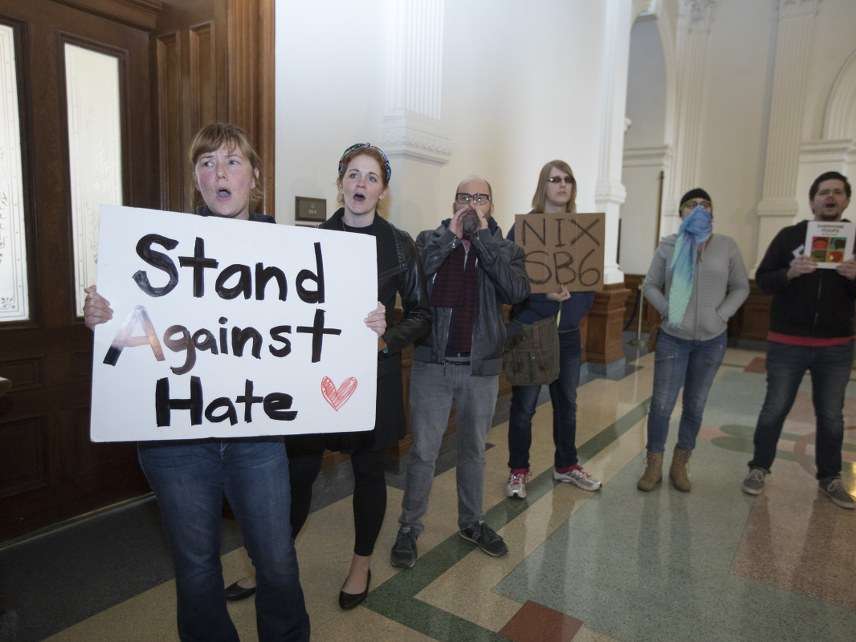Transgender Bathroom Panic Overtakes Texas Legislature's Emergency Session
The culture war can't take a potty break.

You'd be forgiven for incorrectly thinking the governor of Texas put together a special legislative session entirely to decide which bathrooms transgender people are permitted to use in public schools and other government buildings. National media coverage of the session has focused overwhelmingly on just one proposal under consideration: the transgender bathroom bill that won't go away.
In fact, Gov. Greg Abbott called the session because otherwise several state agencies that oversee licensing of a handful of occupations would otherwise have shut down. Under the state's sunshine sunsetting laws, the agencies need to be reauthorized every couple of years. These boards are responsible for overseeing examining and licensing of doctors, psychologists, therapists, and social workers.
But Abbott and Republican leaders also see the session as an opportunity to push their pet projects. One of those projects is SB 6, the bathroom bill, which didn't make it out of the Texas legislature during the regular session. Like North Carolina's infamous bathroom bill, SB 6 would require public school students and people in government buildings to use the restrooms and changing facilities that match the sex they have listed on their birth certificates. The law is to be enforced by fines against school districts or government agencies that don't police restroom use, reaching up to $10,500 for repeat violations.
This part of the law is an intrusive and unnecessary way of tackling something that isn't a problem—an alleged army of predators hoping to pose as the opposite sex in order to target girls in restrooms.
On the brighter side, the law also prohibits cities from passing their own laws telling private entities whether they must or must not accommodate transgender people in restrooms and changing rooms. These transgender accommodation laws tend to swing between complete bans or forced cooperation, and there's only occasionally a nugget that suggests that people can solve the problems on their own. (The worst part of the original law—which tacked on a bunch of new penalties for various existing crimes if they took place in bathrooms—is now gone entirely.)
In addition to the restroom debate, the legislature is looking at bills that would put new restrictions on abortions, prohibit the use of tax dollars to collect union dues, raise teachers' pay, and limiting cities' ability to ban residents from cutting down the trees on their own properties. The full slate of bills being considered can be skimmed at the Texas Tribune, along with links to related stories. Several of these proposals might actually be worthwhile, so it's a shame the bathroom silliness is dominating the coverage.
In particular, leaders want more school choice options for students with disabilities. School districts are resisting the legislation, which is fascinating, in that opponents of choice and charters often use "They don't serve kids as special needs!" as a line of attack when trying to block them. Now the argument is apparently, "The private schools aren't held accountable the way public schools are." Well, if public schools actually are held accountable for how they treat students with special needs, parents wouldn't be trying like hell to yank their kids out, would they?


Show Comments (113)